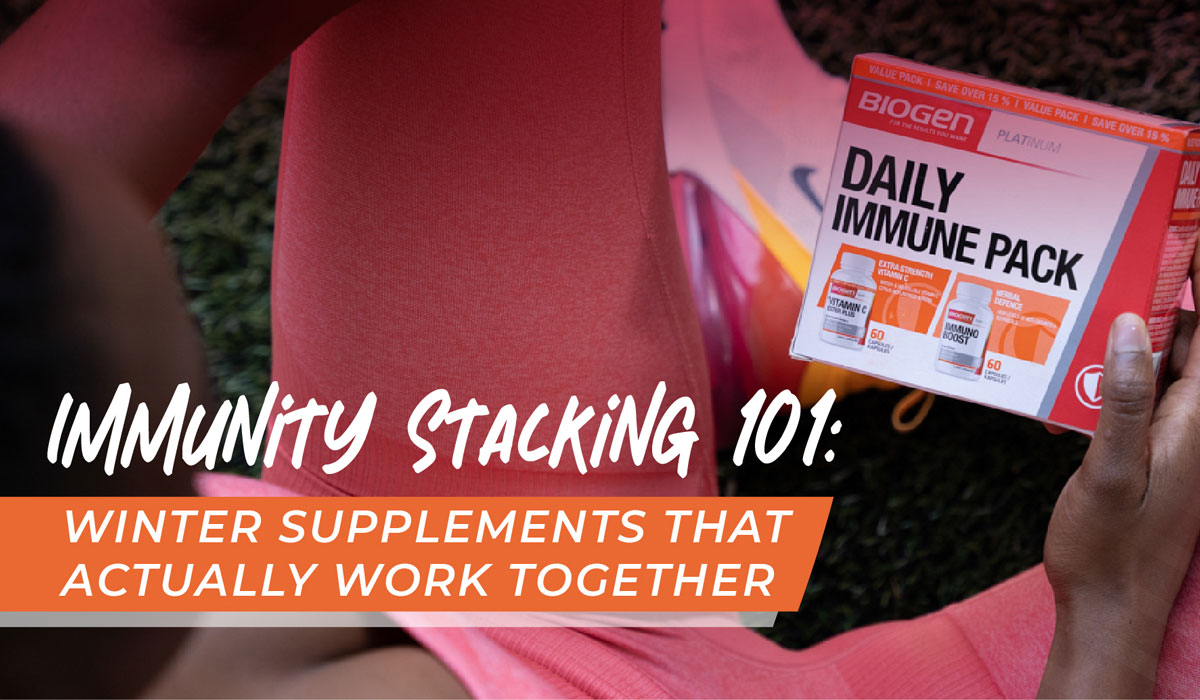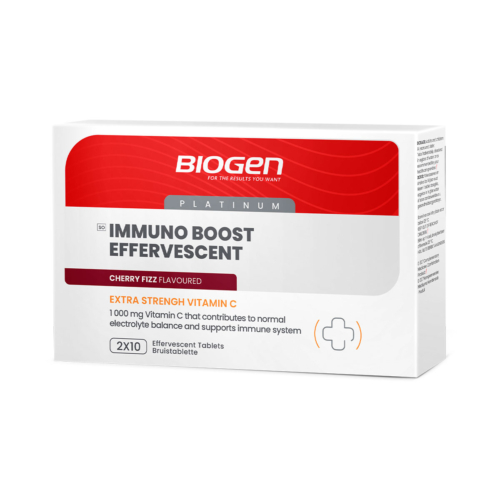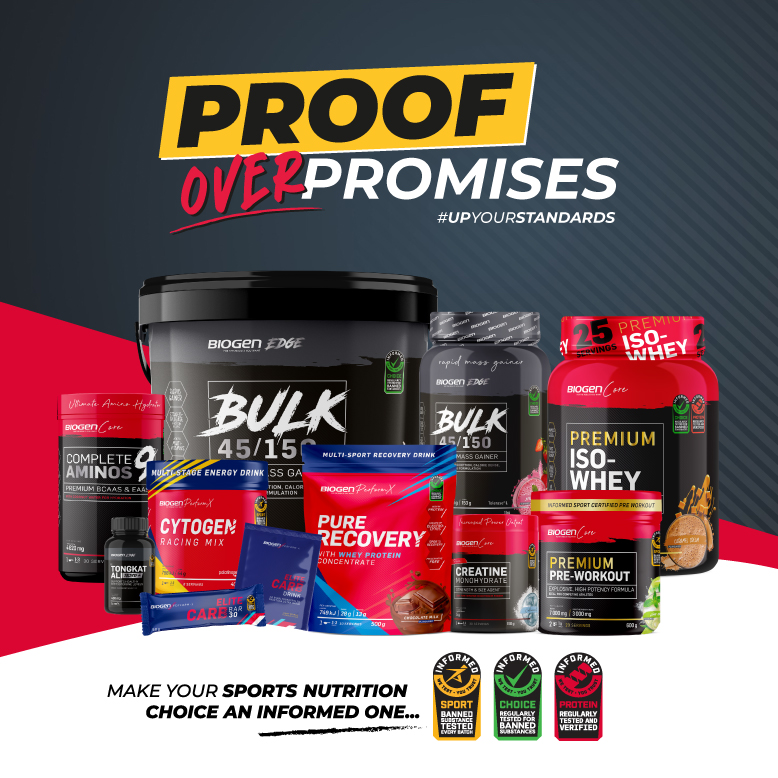
Immunity Stacking Explained: How to Combine Supplements Like Zinc, Vitamin C & Echinacea Effectively
Strong winter immunity is built on a cocktail of vitamins, minerals and other compounds like herbs that support various aspects of our immune system, like boosting immune cell production or barrier function.
While a nutritious and balanced diet should provide most of these nutrients, we may sometimes require extra vitamins and minerals beyond the levels our normal diet can provide.
The immunity trifecta
Zinc, vitamin C, and echinacea are three supplements that may help support your immune function when winter colds and flu are circulating.
To maximise the immune-supporting benefits of these products, it’s important to consider timing, dosing, and how they interact with food and each other.
Our body digests and absorbs micronutrients and active ingredients from vitamins, minerals and herbal supplements in different ways and at different rates.
That means it is best to consume certain products alongside meals – either before or after – while it is best to take others away from meals.
Stick to label recommendations
In general, it is always best to take supplements as directed on the label or according to personalised recommendations from a suitably qualified doctor or healthcare professional.
Certain vitamin and mineral supplements have specific instructions regarding timing, such as taking them in divided doses or at specific intervals.
The other consideration is your meal composition, as certain vitamins and minerals are water-soluble while others are fat-soluble.
Zinc and vitamin C are both water-soluble, which means they dissolve in water and are absorbed into the bloodstream directly from the gastrointestinal tract. They are not stored in the body to a significant extent¹.
Generally, you can take most water-soluble vitamins and minerals with meals (before or after) to enhance their absorption.
All-in-one solution
If you’re less inclined to take these beneficial immune-supporting nutrients as standalone supplements, a comprehensive immune complex combines many of the vitamins, minerals and herbal extracts that may support immune system health and function.
These products offer a convenient and effective means to meet your nutritional demands, especially during cold and flu season.
For example, Biogen Immuno Boost (available as caps or a tasty effervescent) contains vitamin C, zinc and echinacea in a convenient single dose to potentially assist in reducing the severity and duration of symptoms of colds and flu, upper respiratory tract infections and associated conditions by supporting the immune system.
Lifestyle factors
In addition to immune-boosting supplements, there are numerous steps you can take during your day to support your immune system.
Hydration and sleep play synergistic roles with these supplements in strengthening immunity.
Optimal hydration plays a critical role in various physiological processes that defend the body against illness. Adequate water intake makes sure the nutrients from your food and supplements, along with oxygen and immune cells, circulate throughout the body to respond to infections.
Water also helps maintain the integrity of mucous membranes, such as those lining the respiratory and digestive tracts, which act as the body’s first line of defence against invading microorganisms.
When it comes to sleep, getting enough quality shut-eye helps the body produce and release cytokines that act as a signalling molecule for immune cells to fight infections.
Sufficient sleep also supports the formation of memory T cells, which “remember” past invaders and mount a quicker, more effective immune response upon re-exposure.
A lack of sleep can increase levels of stress hormones like cortisol, which can suppress immune function and make the body more susceptible to illness.
Lastly, regular activity is also necessary to build a resilient immune system. Moderate intensity exercise improves immune function, offering potential to reduce the risk and severity of infections.
The right exercise type and intensity can also cause beneficial changes in immune cells, mobilising immune cells like white blood cells and helping to transport them throughout the body due to increased heart rate and blood flow.
SHOP OUR ALL-IN-ONE SOLUTIONS
References:
- Hamid M. Said. Intestinal absorption of water-soluble vitamins in health and disease. Biochem J. 2011 Aug 1; 437(3): 357–372. doi: 10.1042/BJ20110326. https://www.ncbi.nlm.nih.gov/pmc/articles/PMC4049159/
- InformedHealth.org [Internet]. Cologne, Germany: Institute for Quality and Efficiency in Health Care (IQWiG); 2006-. Common colds: Does vitamin C keep you healthy? [Updated 2020 Oct 8]. Available from: https://www.ncbi.nlm.nih.gov/books/NBK279544/.
- Min Xian Wang, Shwe Sin Win, Junxiong Pang. Zinc Supplementation Reduces Common Cold Duration among Healthy Adults: A Systematic Review of Randomized Controlled Trials with Micronutrients Supplementation. Am J Trop Med Hyg. 2020 Jul; 103(1): 86–99. Published online 2020 Apr 27. doi: 10.4269/ajtmh.19-0718.
- Zhai Z, Liu Y, Wu L, Senchina DS, Wurtele ES, Murphy PA, Kohut ML, Cunnick JE. Enhancement of innate and adaptive immune functions by multiple Echinacea species. J Med Food. 2007 Sep;10(3):423-34. doi: 10.1089/jmf.2006.257. PMID: 17887935; PMCID: PMC2362099.
- Karsch-Völk M, Barrett B, Kiefer D, Bauer R, Ardjomand-Woelkart K, Linde K. Echinacea for preventing and treating the common cold. Cochrane Database Syst Rev. 2014 Feb 20;2014(2):CD000530. doi: 10.1002/14651858.CD000530.pub3. PMID: 24554461; PMCID: PMC4068831.










